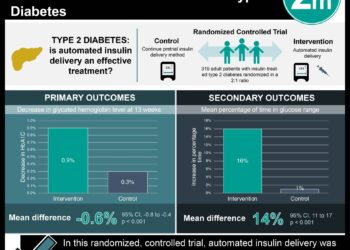Increased Vitamin D concentrations may not decrease type 2 diabetes risk
1. There is no causal link between 25(OH)D concentrations and risk of type 2 diabetes according to this mendelian randomization analysis.
2. A meta-analysis of previous observational studies, however, suggests that a causal link does exist between lower 25(OH)D concentrations and increased risk of type 2 diabetes.
Evidence Rating Level: 2 (Good)
Study Rundown: Low systemic concentrations of vitamin D and its metabolite, 25-hydroxyvitamine D (25-[OH]D), have been shown to be associated with cardiovascular disease states as well as an increased risk of developing type 2 diabetes, but it is unclear if the association with diabetes is causal. The authors of this study applied a Mendelian randomization approach to elucidate if there is a causal link between systemic 25(OH)D levels and type 2 diabetes risk as well as with various glycemic factors. They also applied the same mendelian randomization approach to analyze the associations between four single nucleotide polymorphisms (SNPs) representing 25(OH)D synthesis and metabolism with 25(OH)D concentrations and type 2 diabetes risk. Finally, they compared these results with results from a meta-analysis performed on a set of 22 different observational studies that assessed 25(OH)D concentrations with type 2 diabetes risk.
The results showed that all four SNPs were associated with 25(OH)D concentrations, but were not significantly associated with type 2 diabetes risk or glycemic factors. The meta-analysis of 25(OH)D concentration and risk of type 2 diabetes showed a lower 25(OH)D concentration was significantly associated with an increased risk of type 2 diabetes. Strengths of this study included the large sample size and the use of Mendelian randomization analysis of glycemic traits, which lend further credit to the study design. Limitations of the study included that combining data from multiple studies may have introduced bias and the inclusion of only white European individuals in the analyses may not be generalizable to other populations. The authors suggest that the association between 25 (OH)D concentration and type 2 diabetes risk may not be causal and further research is needed to determine causal factors that may increase 25(OH)D concentration and decrease type 2 diabetes risk based on previous observational results.
This study was funded by the UK Medical Research Council Epidemiology Unit and European Union Sixth Framework Programme.
Click to read the study, published today in The Lancet Diabetes & Endocrinology
Relevant Reading: Role of vitamin D in the development of insulin resistance and type 2 diabetes
In-Depth [combined mendelian randomization analysis and meta-analysis]: This study incorporated 28,144 cases and 76,344 non-cases of type 2 diabetes from several case-control and case-cohort studies to perform mendelian randomization analysis on four SNPs previously found to be associated with vitamin D synthesis and metabolism (DHCR7, CYP2R1, DBP, and CYP24A1). The authors found no significant associations between any of the SNPs and the risk of type 2 diabetes, with a summary odds ratio (OR) of 0.93 (95% Confidence Interval [CI] 0.77-1.13; p=0.46) per a 1 SD (25.0 nmol/L) less concentration of 25(OH)D. A secondary Mendelian analysis showed that there was no significant causal association between the same four SNPs and any of the glycemic factors observed in the study, such as fasting glucose, 2-h glucose testing, fasting insulin levels, and HbA1c (p>0.25). The authors also undertook a meta-analysis of 22 studies consisting of 8,492 cases and 89,698 non-cases of type 2 diabetes comparing systemic concentration of vitamin D and occurrence of type 2 diabetes. This meta-analysis of showed that a 1 SD (25.0 nmol/L) lower 25(OH)D concentration was associated with an increased risk for type 2 diabetes (relative risk 1.22, 95% CI 1.16-1.29; p=3.5×10-14).
More from this author: Benralizumab does not reduce the rate of acute COPD exacerbations; Lifetime diabetes risk rises as incidence increases and mortality decreases; Early alteplase treatment leads to better stroke outcomes regardless of age or stroke severity; Improved hematologic cancer survival in Europe over a 15 year period [EUROCARE-5 study]; Vitamin D may reduce the risk of hypertension
Image: PD
©2012-2014 2minutemedicine.com. All rights reserved. No works may be reproduced without expressed written consent from 2minutemedicine.com. Disclaimer: We present factual information directly from peer reviewed medical journals. No post should be construed as medical advice and is not intended as such by the authors, editors, staff or by 2minutemedicine.com. PLEASE SEE A HEALTHCARE PROVIDER IN YOUR AREA IF YOU SEEK MEDICAL ADVICE OF ANY SORT.







